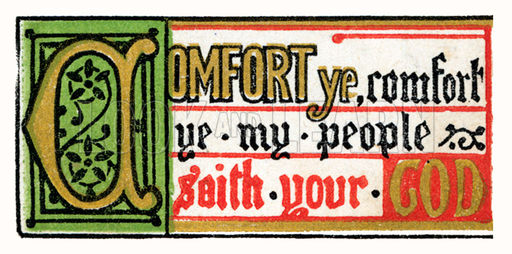Deut. 3:23-7:11 & Isaiah 40:1-26
The challenges and difficulties that we face daily in life are often balanced out by the comforts that we seek. Some seek comfort in this life through food, others seek comfort in the pleasures of this world, while others seek comfort in relationships, riches, or status. Comfort is something that we all seek in one way or another.
What is your source of comfort?
What do you seek when you are feeling hurt, depressed, or troubled?
Who do you run to in time of need?
According to the Bible, the ultimate source of our comfort is found in God alone. Through the prophet Isaiah, God reminded the children of Israel that He alone was their comforter, “I, even I, am He who comforts you. Who are you that you are afraid of man who dies, and of the son of man who is made like grass…” (Isaiah 51:12). God alone is our true source of comfort because He is our Creator, He knows us better than anyone or anything else, and He is eternal. How does God provide this true source of comfort to His people?
Watch this video to view a short summary of this week’s commentary.
Shabbat Nachamu
This Sabbath, August 1, is a special Sabbath on the Jewish calendar. The Sabbath following Tisha B’Av (the ninth of Av), which occurred this past Sunday, is always called “שבת נחמו,” pronounced “Shabbat Nachamu” and carries the meaning of “The Sabbath of Comfort or Consolation.” The phrase “Shabbat Nachamu” is derived from the very first word in the correlating reading from the prophets, which is found in Isaiah chapter forty.
“Shabbat Nachamu,” is the first of seven Sabbaths which are called the “Seven Sabbaths of Consolation.” Each of these “Seven Sabbaths of Consolation” contains scripture readings from the prophet Isaiah which all focus on the comfort of God for His people and for His city, Jerusalem. These seven Sabbaths lead us right up to the Jewish New Year, Rosh Hashanah or its biblical name the Feast of Trumpets.
The “Seven Sabbaths of Consolation” were established by the rabbis to provide a time of comfort after the difficult “Three Weeks” of mourning which culminate in the saddest day on the Jewish year, Tisha B’Av. These seven Sabbaths provide comfort from God through His Word, beginning with this week, “Shabbat Nachamu.”
As mentioned above, the reading from the prophets for this week’s Torah Portion comes from Isaiah 40:1-26. Isaiah chapter forty begins with these well-known words: “נחמו נחמו עמי ימר אלהיכם” – “Nachamu nachamu ammi, yomar eloheichem” – “‘Comfort, O comfort My people,’ says your God.” God Himself is calling out and proclaiming comfort for His people. How does God comfort His people?
The Comfort of God
The comfort of God, as quoted in Isaiah 40:1, is connected to God’s relationship to His people and to His city, Jerusalem. God continued His discourse in Isaiah chapter forty by saying, “Speak kindly to Jerusalem; and call out to her, that her warfare has ended, that her iniquity has been removed, that she has received of the LORD’s hand double for all her sins” (Isaiah 40:2). The first phrase of this verse could literally be translated as “Speak to the heart of Jerusalem…” Either way, the message is the same; the sin of the people and of the city of Jerusalem has been atoned for. The comfort of God for His people and His city was through a declaration of forgiveness and atonement. This is the greatest comfort of all, knowing that one’s sins are forgiven and that a right relationship with God has been established.
The Comfort of the Forgiveness of Sins
There is a story recorded in the gospel of Luke which illustrates this principle well, regarding finding comfort in forgiveness. Yeshua was invited to the home of a certain Pharisee named Simon and reclined at his table to eat. A certain woman, who was considered sinful (most likely immoral), had heard that Yeshua was a guest in Simon’s house. The woman came into the house, stood behind Yeshua, wet His feet with her tears, wiped them with her hair, repeatedly kissed His feet, and anointed His feet with alabaster perfume.
Simon was bothered that Yeshua let this woman touch Him and he said to himself, “If this man were a prophet He would know who and what sort of person this woman is who is touching Him, that she is a sinner” (Luke 7:39). At this point, Yeshua responded to Simon with a parable of two individual men who owed great debts to a moneylender, one man owed him 500 denarii and the other 50 denarii. Neither was able to repay the money and the moneylender decided to forgive them both. Yeshua then asked Simon, “So which of them will love him more?” Simon then responded, “I suppose the one whom he forgave more.” And Yeshua said to him, “You have judged correctly” (Luke 7:42-43).
Yeshua was illustrating and demonstrating the heart of God to comfort people in a way that the Jewish religious system did not understand. Yeshua then said to Simon:
“Do you see this woman? I entered your house; you gave Me no water for My feet, but she has wet My feet with her tears and wiped them with her hair. You gave Me no kiss; but she, since the time I came in, has not ceased to kiss My feet. You did not anoint My head with oil, but she anointed My feet with perfume. For this reason I say to you, her sins, which are many, have been forgiven, for she loved much; but he who is forgiven little, loves little.” Then He said to her, “Your sins have been forgiven.” Those who were reclining at the table with Him began to say to themselves, “Who is this man who even forgives sins?” And He said to the woman, “Your faith has saved you; go in peace.” – Luke 7:44-48
Yeshua could have said many nice words to this woman but the biggest ache in her hurt was to know that her life of sin had been forgiven. Yeshua forgave her sins and His words were like water to her soul. She was now set free to live her life in peace. Forgiveness is at the heart of the comfort which God offers to each of us.
Repentance & Forgiveness
The message of forgiveness is further evident in Isaiah chapter forty as we continue to look at the next few verses: “The voice of one calling in the wilderness, make ready the way of the LORD, make straight in the desert a path for our God” (Isaiah 40:3). This verse and those following it (Isaiah 40:4-5) speak of the forerunner of the Messiah as fulfilled through John the Baptist (Luke 3:4-6). John came to prepare the way of the Messiah with a very specific calling as outlined in the Scriptures: “And he came into all the district around the Jordan, preaching a baptism of repentance for the forgiveness of sins; as it is written in the book of the words of Isaiah the prophet” (Luke 3:3). John was sent to bring God’s comfort to people through repentance and forgiveness of sins.
The message that John preached in the wilderness was powerful and effective. It was a powerful message not because he was an eloquent speaker. Maybe he was or maybe he wasn’t. It doesn’t matter. What we do know is that the power in the message of John the Baptist came through his proclaiming the Word of God. John was set aside from birth to be a man filled with the Holy Spirit and to preach the message of God (Luke 1:15-17). John preached the Word of God and the response of the people was repentance followed by forgiveness. This is real comfort for the soul.
The words of man can only go so far, however, the Word of God is effective to the extent of piercing the heart and soul of a person. We continue to read in Isaiah chapter forty:
“A voice says, ‘Call out.’ Then he answered, ‘What shall I call out?’ All flesh is grass, and all its loveliness is like the flower of the field. The grass withers, the flower fades, when the breath of the Lord blows upon it; Surely the people are grass. The grass withers, the flower fades, But the word of our God stands forever.” – Isaiah 40:6-8
There is no power in the flesh. Without the Spirit the flesh is like grass which fades and withers. Man, who is flesh, is also like the grass and the flowers. Without the Spirit man also dies. Words without the Spirit are dry and meaningless. The Word of God is eternal and never fades. The Word of God brings true comfort as it speaks to the heart of men and women.
The Comfort of Man and the Comfort of God
I want to conclude with one final story that clearly illustrates the difference between the comfort of man and the comfort of God. The man Job endured an extremely challenging time in his life when literally everything was taken from him; his wealth, his workers, his business, his children, and lastly his own health. His wife suggested that he curse God and die (Job 2:9) but Job responded to his wife with these words, “‘You speak as one of the foolish women speaks. Shall we indeed accept good from God and not accept adversity?’ In all this Job did not sin with his lips” (Job 2:10).
During these difficult days of suffering three of Job’s friends came to visit him. Their motives were seemingly good as the Bible records the intent of their visit: “they made an appointment together to come to sympathize with him and comfort him” (Job 2:11). The word for comfort used here “ולנחמו” – “uhlenachamo” (“and to comfort him”) is the same word used in Isaiah 40:1, “נחמו” – “nachamu,” just in a different form.
Job’s three friends had heard of this great calamity which had come upon Job and they came to visit him in order to sympathize and comfort him. The Bible records thirty-seven chapters of dialogue between Job and his friends who were supposed to bring comfort to him. Within these thirty-seven chapters there is very little, if any, words of comfort. It is safe to say that Job did not find any comfort from his friends. In fact, in the middle of this dialogue Job spoke these very words to his friends: “…sorry comforters are you all. Is there no limit to windy words?” (Job: 16:2-3)
Job’s three friends failed to bring comfort to Job. Towards the end of the book of Job God came to speak with Job and as a result Job humbled himself and said these final words: “על כן אמאס ונחמתי על עפר ואפר” – “al ken emas venichamti al afar vaefer” meaning, “Therefore I retract, and I repent in dust and ashes” (Job 42:6). Job’s reaction to God’s Word was simple repentance. The word used for “repent” in this verse is the same root, “נחם,” used for the word “comfort.” There is an interesting connection here between repentance and comfort.
The LORD then spoke to Job’s three friends and rebuked them for not speaking of God what is right as Job had (Job 42:7). God then commanded the three men to bring a sacrifice and to have Job pray for them so that God’s wrath would not be poured out on them. Job prayed for his friends and then God restored double to Job of all that he had formerly lost (Job 42:10-13). It was only at this time that Job was comforted by his family and friends at the hearing and believing of the Word of God (Job 42:11).
I asked the question in the beginning of this study, “How does God comfort His people?” I believe that the answer is simply this, that God provides comfort through His Word and we receive His comfort by believing in His Word. I recently read a fitting statement by Vishal Mingalwadi who wrote: “Jesus said that God’s Word is the seed that blossoms into eternal life when combined with our faith” (The Book that Made Your World, p. 383). These words are true and I believe it is safe to say that there is no other source of eternal life outside of God’s Word. God’s Word is an eternal source of comfort to us if we have ears to hear it and faith to believe it.
What is your source of comfort?
What do you seek when you are feeling hurt, depressed, or troubled?
Who do you run to in time of need?
There are many false comforts in this life that may bring temporary relief, however, there is only one source of comfort that can bring true and eternal peace to our souls and that is God Himself and His Word. God Comforts His People!
Shabbat Shalom!
If you enjoyed reading this article, we invite you to sign up for our weekly Torah Portion commentary on the sidebar to the right.
Torah Portion: Deut. 3:23 – Deut. 7:11
Hafatara: Isaiah 40:1-26
Return to Torah Portion Homepage
Copyright Jewels of Judaism. All rights reserved 2015





Daniel, I just read this article. It is not a casual coincidence for me. I am experiencing right now the greatest pain in years in my family. When I read the verses of comfort for Jerusalem and them about Job as you described, I feel how God is comforting over and over my heart. The last two days I am remembering Job`s affliction; thinking also of how faithful he was before God and how God paid attention to all the process that his children had. I am thankful to God for how He used the Torah Portion of this week to bring to me His comfort. I really need it.
God Bless you!
Dear Yazmin,
Thank you for sharing your situation and praise God for how He is speaking and ministering to you!
God bless you and your family.
Daniel
Well spoken Daniel, speaking of Jobs friends and relatives…..there is no replacement for God !
Thanks dad! Yes, you’re right, God is irreplaceable!